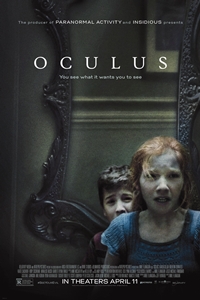Oculus (R) ★★★½
 It seems only fair to mention that growing up, I was terrified of mirrors. Couldn't look at them, couldn't sleep with them in the room, could barely even think about them for fear of conjuring up the darkest conceivable images of what might be living on the other side of their nefarious glass faces. So, yes, I might have been an easy mark when it came to Oculus. But even without lingering childhood phobias, you won't walk away from the film free of tremors. Even more impressively, those looking for something meatier than a few jump scares won't be disappointed either.
It seems only fair to mention that growing up, I was terrified of mirrors. Couldn't look at them, couldn't sleep with them in the room, could barely even think about them for fear of conjuring up the darkest conceivable images of what might be living on the other side of their nefarious glass faces. So, yes, I might have been an easy mark when it came to Oculus. But even without lingering childhood phobias, you won't walk away from the film free of tremors. Even more impressively, those looking for something meatier than a few jump scares won't be disappointed either.
Oculus paints itself with a long, coarse, hyperactive mythology, granting us a history of the demonic mirror in question that dates back to centuries and abounds many questions. But really, the conceit is simple: it's a mirror that f**ks with people. It makes you see things, makes you think things, and makes you do things you wouldn't ordinarily. It ruined the lives of two children when it corrupted and killed their parents (Katee Sackhoff and Rory Cochrane), and threatens to finish the deed when the estranged siblings reunite in adulthood to enact revenge. Tim (Brenton Thwaites) has spent the past decade in a mental hospital, chalking up the supernatural nightmares of his childhood to psychiatric delusions. His sister Kaylie (Karen Gillan), the together one with a job and a fiancé, has spent her time tracking down the haunted antique to do away with it once and for all. Back in their old house with the mirror in her possession, Kaylie sets her meticulously constructed plan into action, with a reluctant Tim in tow.
And yes, obviously, everything goes awry.
The mirror's grasp on the minds of its victims exhibits an impressive imagination in writer/director Mike Flanagan. Oculus doesn't hit us with a long supply of ghoulish figures, opting instead for haunting mind games that really land in the construction of an unsettling aura: because of the nature of the mirror's powers, we never know if and when what we're seeing is real. It's not a particularly new conceit for horror or thriller, but it's one that works well. Especially when you're engaged with the people suffering through this tormenting reality.
And we are. The horror of the movie isn't relegated to the mirror's demonic trickery. The far more interesting material exists between the emotionally distant siblings. While Kaylie clings to the only companion she has in the trauma that tore her family apart, Tim wants to leave his nightmares behind him, and perhaps his sister as well. Jumping between flashbacks and the current timeline, Oculus plays with relationships in a terrific way: those between parent and child, husband and wife, brother and sister, and - most importantly - past and present selves.
Oculus is far from a fun movie, but it does seem to be playing a few games with its ideas - the ideas inherent in the malleability of perception, or the delicateness of relationships. Although it doesn't quite deliver in its conclusion, Oculus works through its premise with aplomb. While it might well have gotten away with the concept of a spooky mirror just fine, it opts instead to tackle many of the concepts that horror was invented to explore. And the result isn't just interesting, it's genuinely scary.
To get the full Quicklook Films experience, uncheck "Enable on this Site" from Adblock Plus
box office top 10

Challengers Released: April 26, 2024 Cast: Josh O'Connor, Mike Faist 15M

Unsung Hero Released: April 26, 2024 Cast: Daisy Betts, Joel Smallbone 7.8M

Godzilla x Kong: The New Empire Released: March 29, 2024 Cast: Rebecca Hall, Brian Tyree Henry 7.2M

Civil War Released: April 12, 2024 Cast: Kirsten Dunst, Wagner Moura 7M

Abigail Released: April 19, 2024 Cast: Melissa Barrera, Dan Stevens 5.3M

The Ministry of Ungentlemanly Warfare Released: April 19, 2024 Cast: Henry Cavill, Eiza Gonzalez 3.9M

Kung Fu Panda 4 Released: March 8, 2024 Cast: Jack Black, Viola Davis 3.6M

Ghostbusters: Frozen Empire Released: March 22, 2024 Cast: Paul Rudd, Carrie Coon 3.3M

Dune: Part Two Released: March 1, 2024 Cast: Timothée Chalamet, Rebecca Ferguson 2M

Boy Kills World Released: April 26, 2024 Cast: Bill Skarsgård, Famke Janssen 1.7M






